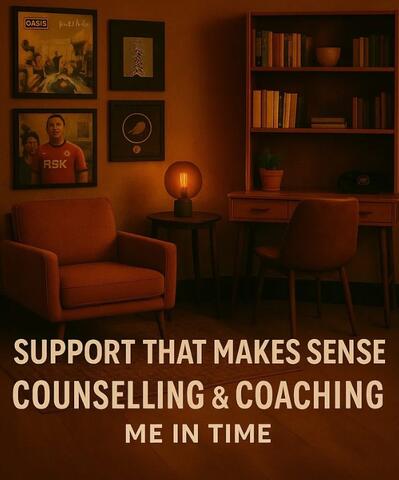
24 Sept 2025 ● Stuart Walker
Starting Out in Private Practice: What No One Tells You, By Stuart Walker

Embarking on the journey of private practice has been both enlightening and challenging for Stuart Walker. From the outset, he faced the lull that many new practitioners experience. The silence after setting up a website, polishing a directory entry, and preparing to welcome clients, only to find the phone does not ring and the inbox stays empty.
Overcoming this period of uncertainty allowed him to gain invaluable insights into the realities of private practice: the importance of staying true to yourself, gaining clarity about your specialism, showing up consistently, nurturing relationships, and exercising patience.
In this article, Stuart shares his insights with readers to help them navigate the early stages of private practice.
You have finished your Level 4 Diploma. You have survived your placement hours, written enough case studies to wallpaper your living room, and spent long nights thinking about your specialism. You have sorted your directory entry, polished your website, and even picked a font that feels "therapist but approachable."
You sit back, ready for the clients to roll in.
And then… silence.
Welcome to the lull.
It does not matter how well you prepare — most new practitioners hit this stage. The phone does not ring, the email inbox stays suspiciously empty, and you start second guessing whether you should have just retrained as a dog groomer instead.
The truth is the lull is not a sign you have failed. It is part of the process. And in some ways, it is a rite of passage. It tests your patience more than your skills.
Sooner or later, you will find yourself lurking in counselling groups online. You will see the familiar posts:
- “How long did it take to get your first client?”
- “What worked for you?”
- “Is it normal that I have not had a single inquiry yet?”
It is reassuring to know others have been there too, but it is also a slippery slope. Someone will always sound like they are fully booked after three weeks, and it can feel like you are already behind before you have even begun.
The spoiler is this: there is no magic number. For some, it is weeks. For others, months. For most, it is stop–start, trickle–flow, one step forward, half a step back.
The honest answer to “how long does it take?” is longer than you expect, and shorter than you fear. Growth in private practice is rarely a straight line. The important thing is to keep perspective and resist the urge to measure yourself against others.
This is usually when the shiny adverts appear:
- 'Get ten clients in ten days'
- 'I will share the secret formula to filling your diary — only £20'
- “'Join my mastermind — £2000 and you will never look back'
Now, I am not dismissing them all. Some have real value. But most tend to fall into the same categories:
- SEO tricks: 'if you just use this keyword clients will find you'
- Directory upgrades: 'pay for premium placement and watch the enquiries roll in'
- Social media bootcamps: 'post three times a day and you will never have an empty slot again'
- Niche workshops: 'find your exact client avatar or risk being invisible'
None of these are bad. In fact, a couple might even be worth your money later down the line. But they are not magic bullets. They cannot skip you past the part where you slowly build confidence, consistency, and visibility.
When you strip it back, the most important parts of private practice are not things you can buy.
Staying true to yourself.
Your practice does not need to look like anyone else’s.
Clarity about your specialism.
Who do you really want to work with? Who lights you up?
Consistency.
Show up. Write something. Share something. Do it again tomorrow.
Relationships.
This is where the magic often happens. Reach out to local organisations and charities and let them know what you offer. Look for networking groups or counsellor meet-ups in your area — and if they do not exist, create one. Suggest a coffee with peers. Most people will say yes. Make connections on LinkedIn, not just with other therapists but with professionals in adjacent fields. Offer to support local initiatives or community projects. Consider offering low-cost sessions at the start if it helps you gain experience and confidence.
Patience.
Let practice grow at its natural pace.
The more you put yourself out there, the more likely it is that the phone starts to ring — not because you bought a formula, but because you are visible, connected, and slowly building trust.
Some of your best opportunities will come from the conversations you spark and the relationships you nurture. Networking does not have to be corporate or forced. It can be a coffee with a colleague, a chat after a CPD event, or a message to someone you admire on LinkedIn.
Private practice is often painted as a solo journey, but in reality it is built on community. The stronger your web of connections, the steadier your practice will grow.
Setting up in private practice is exciting, but it is also unpredictable. The lull does not mean you are doing it wrong. It means you are human, and you are in the same boat as thousands of counsellors before you.
Clients do come. Slowly at first, then more steadily. Private practice is not about quick wins or secret formulas. It is about building something steady, authentic, and truly yours.
So take a breath. Trust your process. And when the lull feels too loud, remember this is part of the story you will one day tell a new graduate who is staring at their inbox and wondering if they should have gone into dog grooming instead.
Final Thoughts
If you are just starting out, you are not alone. Reach out. Connect. Share a coffee. Join a group. Send the message. Keep going. The clients will come.
I know because I have been where you are — and the majority of therapists, counsellors, and coaches have been in the same place. I am not an expert — just a southern voice with a northern soul.

About the Author
Stuart is an integrative humanistic counsellor specialising in men’s mental health, bereavement, and postvention support after suicide. He is the founder of Me In Time Counselling & Coachingand has extensive experience working across private and public sectors in coaching, mentoring, and therapeutic roles.
A registered member of BACP, Stuart is committed to creating safe, non-judgmental spaces where clients can explore their challenges and develop meaningful strategies for coping and growth.


